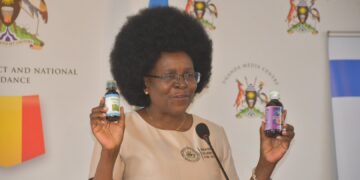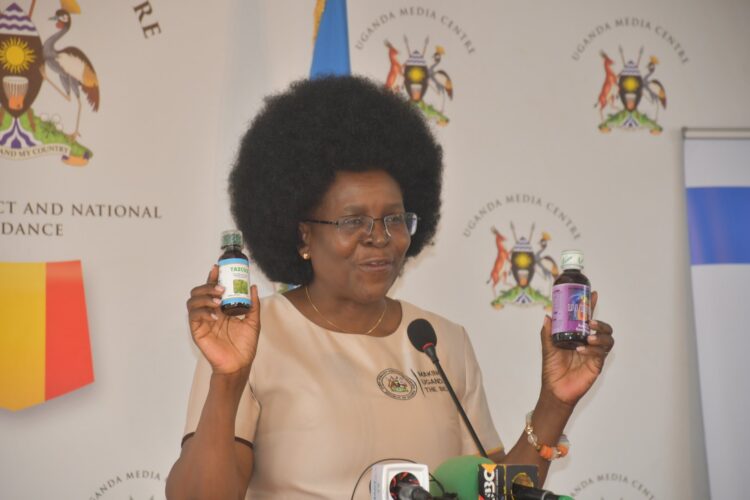By Leonard Kamugisha Akida,
KAMPALA
The Minister of Science, Innovation, and Technology, Dr. Monica Musenero, has announced plans to seek approval from the National Drug Authority (NDA) for certification of two herbal medicines—Vidicine, developed by Kanzira Herbal Medicine, and Tazcov, innovated by Busitema University—for the treatment of acute respiratory illnesses.
According to Dr. Musenero, the request follows successful clinical trials conducted at the Makerere Lung Institute. She stated that trial results demonstrated the medicines’ safety and effectiveness.
“These medicines will significantly improve healthcare, particularly for rural communities suffering from conditions such as obstructive pulmonary disease, asthma, influenza, and pneumonia,” she said.

Speaking during the dissemination of clinical trial results of the herbal medicines at Media Centre Kampala on Monday, Dr. Musenero highlighted the economic potential of these herbal treatments, noting that their approval would create new business opportunities, generate revenue for the country, and help herbalists transition from subsistence to commercial production.
“It’s time for Uganda to leverage its rich biodiversity and tap into the global market for natural therapeutics, which is valued at over $216.4 billion,” she added.
Herbal Medicine Faces Perception Challenges
Speaking at the Uganda Media Center in Kampala, Dr. Edward Kazire, CEO of Kazaire Herbal Medicine, emphasized the need to change public perceptions of natural therapeutics in Uganda.
“Herbal medicine in Uganda is often unstandardized, poorly packaged, and wrongly associated with witchcraft. The government must recognize that traditional herbs are legitimate medicines, not superstition,” he said.

Dr. Kazire revealed that Vidicine had previously been sold without NDA approval. He stressed that official approval would open doors to international markets and create jobs for Ugandans.
“This medicine is made from locally grown herbs. Over 310,000 farmers will cultivate the fruits and medicinal trees needed for its production, creating employment opportunities,” he explained.
He urged the government to support herbalists by facilitating clinical trials for natural therapeutics and fostering collaborations with universities and research institutions.
ARTIs: A Leading Cause of Mortality
Acute Respiratory Tract Infections (ARTIs) rank among the top five causes of morbidity and mortality worldwide, accounting for approximately 3.9 million deaths annually. Prof. Pauline Byakika Kibwika, Vice Chancellor of Mbarara University of Science and Technology (MUST), noted that ARTIs disproportionately affect children and can have severe health consequences if not treated promptly.
Prof. Pauline Byakika Kibwika, Vice Chancellor of Mbarara University of Science and Technology (MUST), noted that ARTIs disproportionately affect children and can have severe health consequences if not treated promptly.
“In Uganda, ARTIs remain a leading cause of illness and death among children under 15 years, accounting for about 9% of fatalities,” she said.
She further revealed that over 14 million ARTIs cases are reported annually in Uganda, with outpatient treatment costing approximately UGX 12,000 per visit and inpatient care reaching UGX 600,000 per episode.
Clinical Trials Show Promising Results
Dr. Musenero commended the innovators behind Vidicine and Tazcov for subjecting their products to clinical trials. She noted that further studies are recommended to optimize dosing and minimize side effects. The phase 2A clinical trials involved over 510 participants aged 18 and above from nine public health facilities in Kampala. The results confirmed that the medicines were both safe and effective in resolving symptoms and clearing viruses linked to acute respiratory illnesses, including influenza types A and B, COVID-19, and respiratory syncytial virus (RSV).
The phase 2A clinical trials involved over 510 participants aged 18 and above from nine public health facilities in Kampala. The results confirmed that the medicines were both safe and effective in resolving symptoms and clearing viruses linked to acute respiratory illnesses, including influenza types A and B, COVID-19, and respiratory syncytial virus (RSV).
If approved by the NDA, these herbal medicines could offer a locally developed, scientifically validated alternative for managing respiratory illnesses in Uganda and beyond.








































